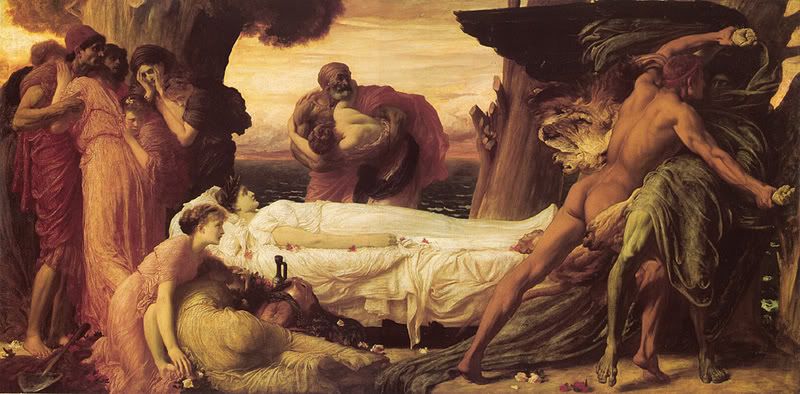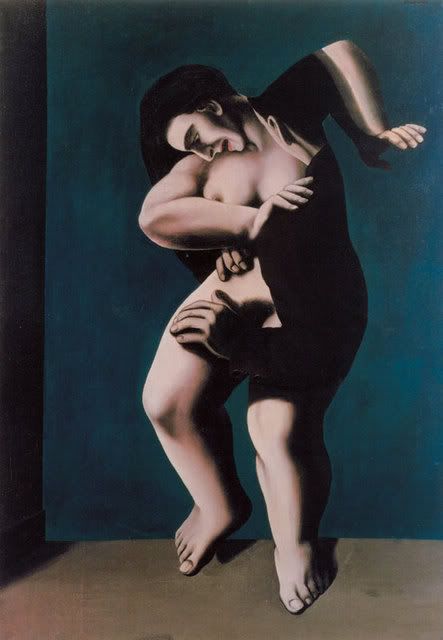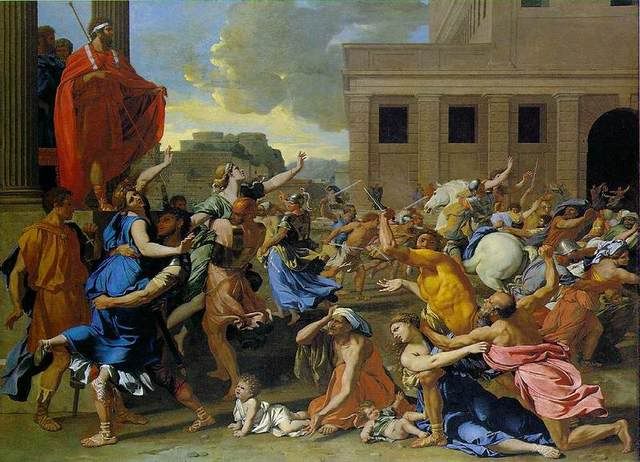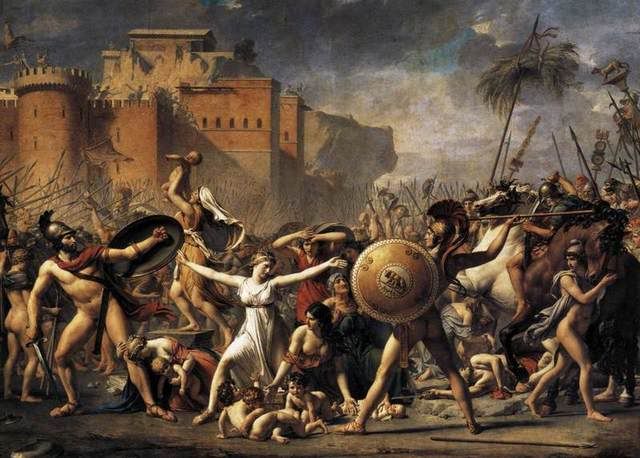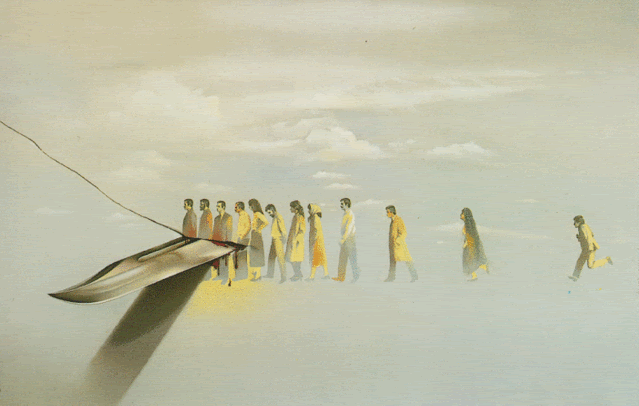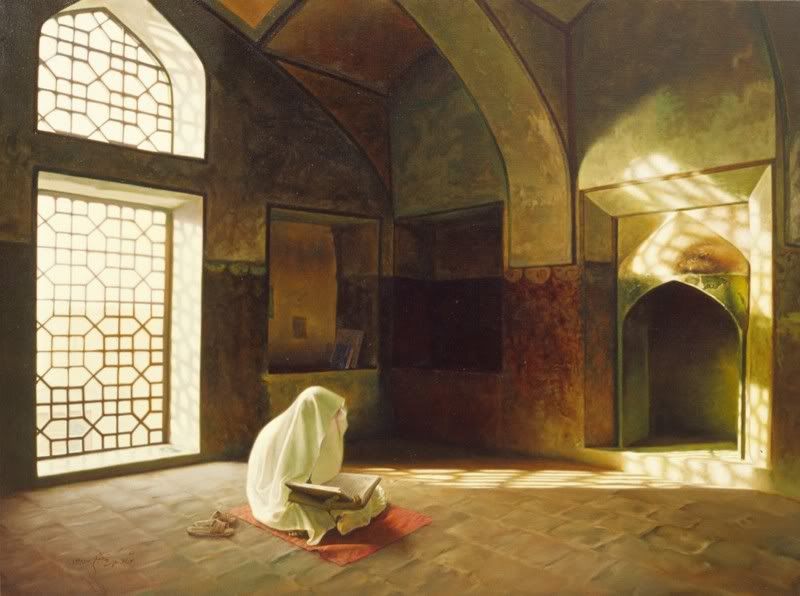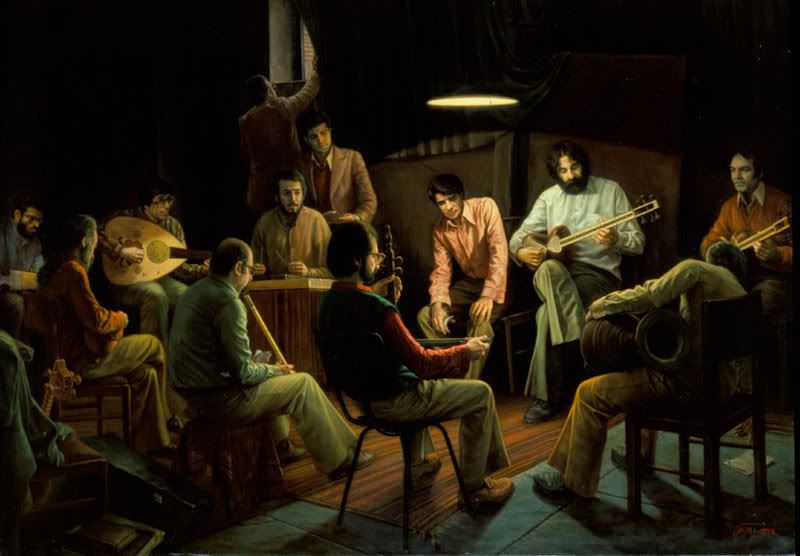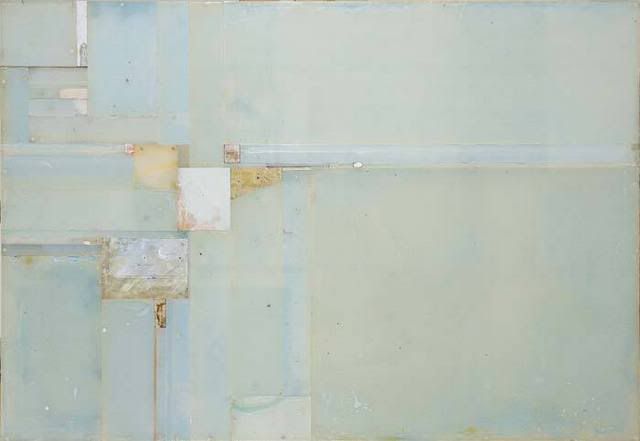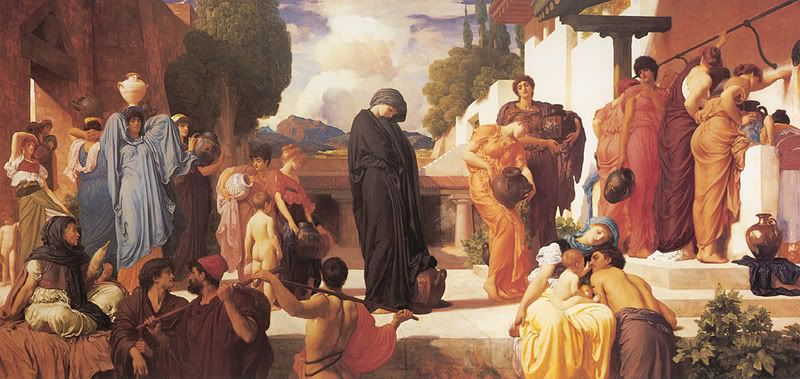
Frederick Leighton, "Captive Andromache" (1888)
In most conversations regarding human rights and the values of political Liberalism I have a tendency to hide behind the thoughts of others. I will explicate and defend Kant or Husserl. But at a certain point, one must step from behind the curtain and be honest in how one evaluates the current situation. As much as I am sympathetic to Kant and Husserl, and I have a great deal of admiration for them both, I do think there are limits to the Liberal tradition, not least of which is its own inability to recognize its status as a tradition. This is a critique around which the Right and the Left can usually find agreement. Liberalism, of necessity, fails to realize that it was born out of a certain historical moment and a certain cultural setting. It is the expression of emergent voices whose wishes, desires and ideals were formed in light of a host of cultural, political, social, religious and economic changes that gripped Europe in the transition from the Late Middle Ages to Early Modernity that have continued to find their fulfillment into the present where those voices are now culturally dominant.
Moreover, insofar as Liberalism has taken itself to be the established and eternal truth about humanity, it is simply another dogmatic fundamentalism. It insists that its principles be imposed universally on all humanity and seeks the legal codification of those principles. Those who question, those who ask if there might not be some point beyond Liberalism-Capitalism are declared to be heretics and enemies of humanity. They find themselves at the mercy of the legal powers of governments who view them as colluding with the enemy, in many cases they find their ability to travel restricted and in the most extreme cases find themselves literally criminalized.
All of that said in acknowledgement of Liberalism's limits and flaws, it must nonetheless be affirmed that the values of political liberalism did arise out of a real engagement with the meaning of being human and the human desire for wholeness or completeness. Any discussion of human rights has to remain rooted in that quest(ion) concerning the nature of the Good or it loses any real power to hold the imagination while it likewise loses its legitimacy as something more than the expression of power and imperial domination by Anglo and European governments over "lesser" and "sub-human" regimes.
Next, and more controversially, in the present historical moment, Liberalism is the only truly progressive political force in existence. This situation places Christians and Muslims (and Marxists, etc.) in a difficult position. Christianity by linking itself with the forces of domination and war in the late Middle Ages and stubbornly holding onto that alignment throughout the 19th and even 20th centuries quite rightly lost its legitimacy to guide the public discourse concerning the nature of socio-political life. For that reason it exists as a marginal moment within the larger entity that is Liberal Society. Moreover, in significant ways it has continued its legacy of identification with those in power and, with little fuss on its own part, has allowed itself to be absorbed into Liberal life, adapting itself to the new situation and thereby forfeiting any chance of offering an alternative. It has contented itself with being a purely civic institution. Liberalism is after all capable of tolerating and even using what it accepts as 'good-religion': religious civil institutions which are willing to accept their role in liberal society and the new and limited definition of religion as a private and interior matter.
It is this capitulation on the part of Christianity that many Muslims see and it quite appropriately leaves them skeptical. Islam remains the most adequate expression of humanity in large portions of the world. Islam remains, in a large portion of the world, the one living force capable of resisting real tyranny; a way of understanding their lives that does not capitulate to arbitrary powers and repressive and dehumanizing forces of government, but is instead felt and lived as their own. Therefore, when they see other ‘People of the Book’ losing their own identity to the point where Anglo-European Christianity is largely indistinguishable from the culture of Political Liberalism and Capitalism and when the greater Muslim world sees that Christianity has, within the dominant political climate, proven incapable of offering another vision or countering the most destructive effects of Liberal life, they are largely unimpressed with Liberalism and its so-called freedoms.
Nonetheless, it likewise seems to me that political Islam, as it has manifested itself in recent years has demonstrated itself inadequate to the demands of the historical moment and in fact has proven itself to be as socially and politically regressive as any clerico-cratic or ecclesiocratic (if refuse to call them theocratic states, because that suggests that somehow god is ruling and not human beings) might be expected to be. It too has been equally fundamentalist; it too has proven unable to ask about the future of humanity because it also has taken the discussion to be over, albeit settled in a past out of which humanity is now called to repeat rather than Liberalism’s timeless-eternal present. If there is to be a political Islam that will offer an alternative to the spread of Liberalism (and I must admit I have my doubts on this score at least for the moment), it will have to be one which does not look to the past, but one which, having been born of that past is able to hear the voice of God speaking anew. One can also say, on the reverse side, that Liberalism has failed to grasp, due to its own fundamentalist dogmatism, the manner in which Islam is in fact its natural ally against tyranny.
For the moment though, the truth is that neither Islam nor (to an even greater degree) Christianity find themselves in a position in which they can offer a realistic and progressive political alternative to the hegemony of the Liberal-Capitalist order. In fact the situation for many of us is that we are de facto liberals-against-the-letter. Even as we find ourselves standing "outside", there is, at the same time, no outside in which to stand. We are a people without a home. And in this homelessness, the possibility of dissent and advocacy for change resides in the maintenance of Liberalism. There is no place outside Liberalism within which we can make a stand. And so, we find ourselves having to make common cause, having to create a Popular Front, if you will, with Liberalism precisely because we have to recognize its progressive value even in the midst of its failures and limits.
If this is so, then we cannot fully separate ourselves from the discourse of Liberalism, even if, in our hands, the language of Liberalism is transformed and finds itself strained to limits that it cannot ultimately bear. The task of those who believe that the question of the human good remains open, that humanity has a Future, is to push the forces of progress to their limit so that it becomes clear where the contradictions are, in order that one might glimpse, in the fractures of the present, some hope that there will be a Future. To push Liberalism to the fullness of its possibilities so that it will be eventually (and I do not think we are close to being there yet) made aware of its own historicity and inability to fulfill itself. And finally we must constantly remind Liberalism of a truth that it would like to forget: namely, that insofar as it believes it has answered the question of the nature of the human good, it remains a form of religion; it tries to meet the human desire for the Good. Liberalism, in many cases, would like to forget this. It would like to say that it consigns the religious to the private sphere. But if it forgets that Liberalism was born out of an attempt to restate the nature of the good life, if it fails to discuss Human Rights as truths grounded in the very nature of being human, arising from the need of humanity to be whole, then liberalism will lose the very force that makes it a progressive reality. Liberalism will lose the very thing that makes it the manifestation of a broken-Truth.
-LoA

